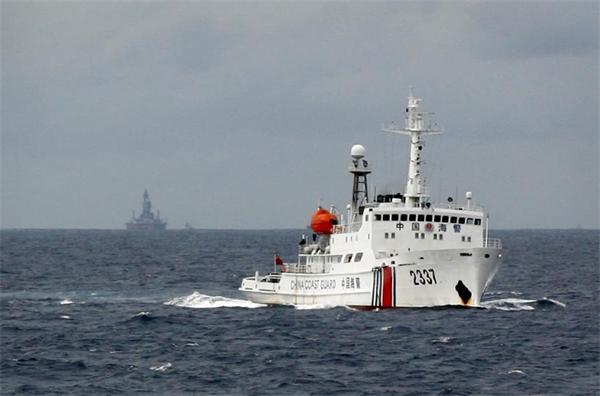 |
|
A Chinese Coast Guard vessel (R) passes near the Chinese oil rig, Haiyang Shi You 981 (L) in the South China Sea. [Photo/Agencies] |
This year's Shangri-La Dialogue, held in Singapore over the weekend, was overshadowed by disputes in and differences over the South China Sea. Such a deviation from major security issues cannot possibly make the region's countries work together to tackle security threats and risks.
US Defense Secretary Ashton Carter used much of his keynote speech on Saturday to lash out at China over the South China Sea issue. Carter said the United States was deeply concerned about the scale and speed of China's reclamation work on some islands and islets, and insisted that US forces would continue to "fly, sail and operate" in the region to ensure the freedom of navigation and overflights permitted by law.
Carter's remarks are the latest US attempt to put more pressure on China over the reclamation work on Nansha Islands. Differences over reclamations started before the security forum was held. The US and the Philippines have been leading a chorus of criticisms against China's legitimate activities, raising time and again the temperature of the waters in the South China Sea.
In response, Admiral Sun Jianguo, deputy chief of the General Staff of the People's Liberation Army who addressed the forum a day after Carter, explained China's stance on island rebuilding. He said China's construction in the South China Sea is mainly to improve the functions of the relevant islands and reefs and the working and living conditions of the personnel stationed there.
Sun emphasized that the projects are designed in ways to help China better perform its international responsibilities and obligations in maritime search and rescue operations, disaster prevention and relief, marine research, meteorological studies, environmental protection, navigation safety and fishery production.
China, Sun said, has built an ocean survey station for the United Nations on Yongshu Jiao reef, and started building two multi-functional lighthouses on the Huayang Jiao and Chigua Jiao reefs to provide international public services.
His explanation should help dispel unnecessary concerns of the international community. As a big country which relies on the South China Sea as an important transport channel, China concerns about the safety and navigability of its waters more than any other country. China's reclamation work does not affect the freedom of navigation and overflight in anyway. And the US just wants to use freedom of navigation as a pretext to interfere in the South China Sea issue.
In recent years, the US has hyped China's maritime disputes with some Southeast Asian countries at regional forums such as the Shangri-La Dialogue and East Asia Summit.
The US meddling has only further complicated the issue and sowed seeds of discord in the region.
Washington's assertion that it will continue to send military ships and planes to patrol the waters near the areas where Beijing is carrying out building activities could lead to strategic misjudgments and thus make the waters less secure.
As a country which claims to have a stake in world peace and stability, the US could do better to contribute to regional and world peace and security, instead of carping over the South China Sea issue. For instance, it should make more efforts to protect the world from its biggest threat today the Islamic State, which has been wreaking havoc in the Middle East.
At the Shangri-La forum, the region's countries vowed to strengthen collaboration insecurity, especially in fight against terrorism. In his keynote speech at the forum on Friday, Singapore Prime Minister Lee Hsien Loong said the IS could pose a serious threat to whole of Southeast Asia, because more than 500 Indonesians and dozens of Malaysians had joined the terror group.
Since the IS group has already conquered large swathes of land in Iraq and Syria, isn't it time the world's sole superpower shouldered its due international responsibilities?
The author is a senior writer with China Daily. wanghui@chinadaily.com.cn